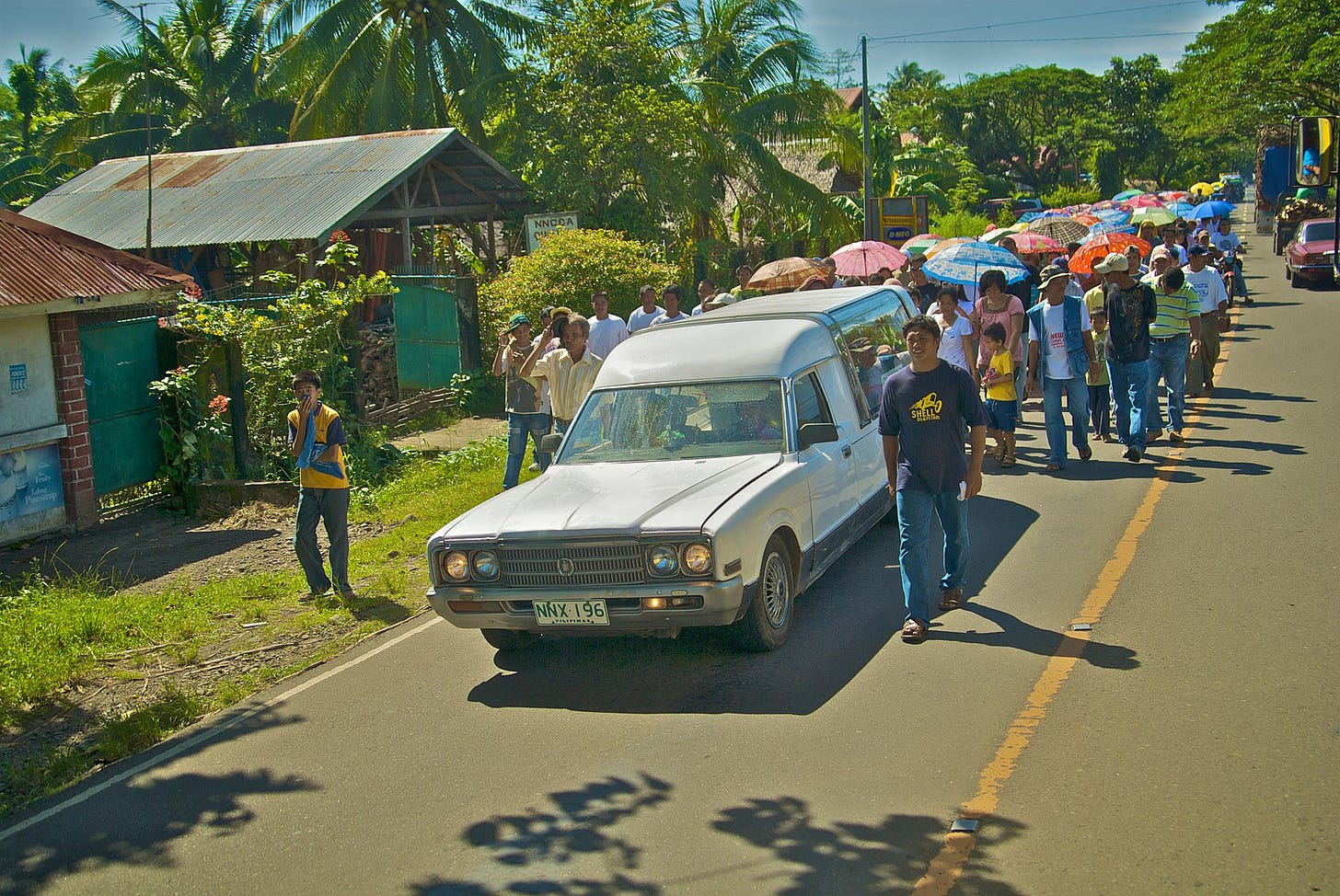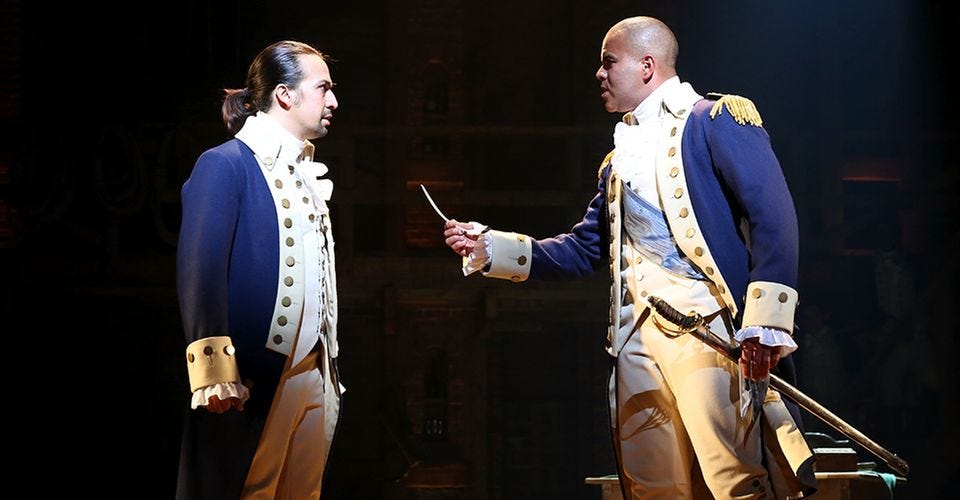Theory is easy, practice is harder
The Overlap #16
Welcome to The Overlap, a newsletter on product & org design that comes out every other Wednesday. I initially was going to release our next newsletter on January 13th. Turns out I needed this one to be out sooner than later. This means our next newsletter will come out on January 20th.
This one’s on death, theory, and practice.

My great aunt passed away from COVID on December 27th. To process, my extended family has been practicing Novena: a Catholic ritual where the mourning family prays for nine straight days after the death of a family member.
I had a weird relationship with Catholicism growing up. I didn’t grow up Catholic, but most of my friends were. My mom and dad stopped practicing Catholicism before I was born. And younger me looked down on rituals—I interpreted them as people going through motions that produced no outcome.
My mom knew I hadn’t experienced Novena. So she explained to me that Novena helps a family mourn, grieve, and move forward after the death of a loved one.
Being the self-management guy I am, I asked her, “Shouldn’t it be up to the person who passed to decide how the funeral goes? Wouldn’t that honor that person’s wishes?”
“The funeral is more for the family than it is for the person that passed. Since it’s for the family, it should ultimately be up to them,” my mom said.
“Wouldn’t it be better for the family and the person who’d pass to both decide how the funeral would go? Like Mom, how would you want your funeral?” I tried to reconcile both views.
Mom: “I don’t mind how you decide to organize the funeral. Just continue what I’ve taught you. Live happy, healthy lives.”
My conversation with my mom reminded me of a conversation between George Washington and Alexander Hamilton from the Hamilton musical. Bear with me. The more you listen to the Hamilton soundtrack, the more it fills your subconscious until it becomes it.
If you haven’t watched Hamiton, there’s a part where Hamilton was frustrated, unable to convince congress to start a national bank.
Hamilton: We need bold strokes, we need this plan
Washington: No, you need to convince more folks
Hamilton: James Madison won't talk to me, that's a nonstarter
Washington: Ah, winning was easy, young man, governing's harder
Winning was easy, governing's harder. Washington was advising Hamilton on how winning over his cabinet isn’t as easy as Hamilton thought it would be.
Now I’m not saying getting rid of national debt is similar to processing a family member’s death. But in a way, my mom and I were “governing” how to decide on her future funeral. And like Washington said, governing was hard.
I have no clue what my mom’s future funeral should be. Will there be a wake? A Catholic Novena? A burial, cremation, or organ donation? A Zumba session? (My mom loves Zumba.)
My siblings and I have the autonomy to design our mom’s future funeral because our mom knows that her kids will know how to process her death in the healthiest way possible. It’s silly to say, but my mom is being a self-management advocate for her funeral. And while she’s handling this so maturely, I want her to tell me and my siblings what to do when she dies. Imagine me, a self-proclaimed self-management advocate, wanting to be told what to do. Ha!
It’s easy to win others over on the idea of self-management. Of course, we should let decisions be up to those who will be most affected by them. Of course, we shouldn’t depend on our boss to set our priorities. Of course, our teams should be empowered to make their own decisions.
However, perhaps self-management only works in complex (unknowable) situations and backfires in complicated (knowable) ones. Helping a family process the death of a loved one is more a complicated problem than a complex problem. We know for a fact that everyone dies. Humans have dealt with death since we’ve existed. We’ve had centuries-old traditions—Novenas, burials, cremations—to help us grieve.
Or perhaps self-management only works in business but not in families. I can’t just take an idea that’s designed for business teams and apply it to my family context.
Is helping a family process death a complicated problem (rather than complex)? Does self-management only apply to business and government, but not family? I’m not sure what’s more true.
What I am sure of is that I have an opportunity to be more generous towards traditions. Even if I disagree with any assumptions behind them. Even when I think I see a better way. I’m doing the people I care about a disservice when I don’t do the work of understanding why that tradition exists in the first place. So I’m practicing being generous towards said traditions. The more I practice generosity, the more everyone builds off what already works.
I used to believe that theory exists to give people a vision of how the world should be. Now I believe theory exists to help us practice, learn, and then update those theories.
Theory is easy, practice is harder.
I’m still not sure how to best organize my mom’s future funeral. A good friend once told me that whenever you feel stuck on a problem, bring the problem to your group and trust that you and your group will solve it. So I’ll ask my immediate family how they’d organize my mom’s future funeral. We’ll figure it out.
What I’m Reading
1/ A Nihilist’s Guide to Meaning
Whether you are religious, a nihilist, or just someone who loves their job, meaning is a super interesting topic. To stay on-newsletter-brand and avoid veering into an existential tangent, the practical application of this essay is that this will help you understand why some people find meaning in their work while others don’t.
Finding meaning in your work can be a result of filling an internal void that religion typically fills. Not finding meaning in your work can be a result of seeing how its in a company’s nature to treat employees as fungible. Both are fine.
2/ No More Forever Projects
Treat beginnings like endings: celebrate them, document them, let someone else pick up where you leave off. If the project’s worth repeating, there’s nothing to say you can’t still be the standard-bearer. But at least it’s a choice. By ending well, you give yourself the freedom to begin again.
3/ The Patient Change Agent
I’m reading this essay once a year it seems. All change within some system (business, climate, government, police, prisons) starts and ends with patience.
4/ On morality, hero worship, and why judgment isn’t helpful
I think with lines like "there is no ethical consumption under capitalism," it can be easy to become nihilistic and give up altogether. I think that we have to both accept that we can only do so much and that we can also always do more.


